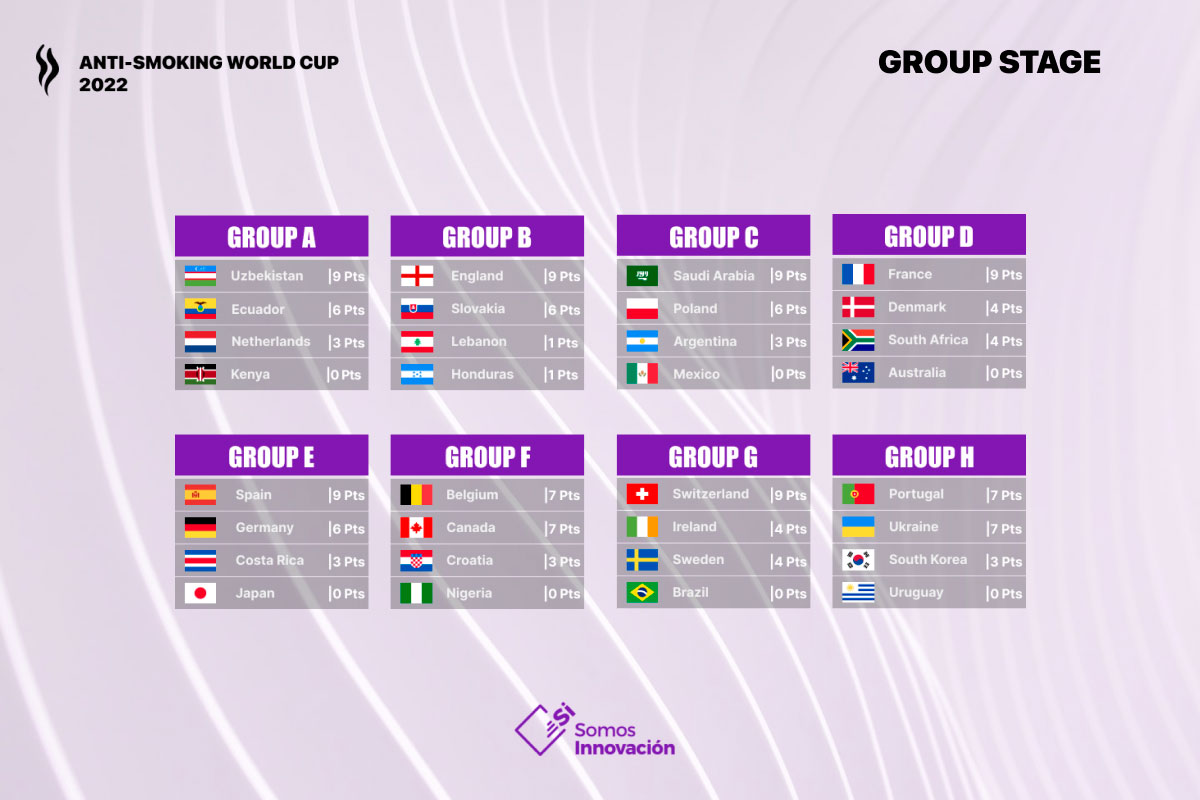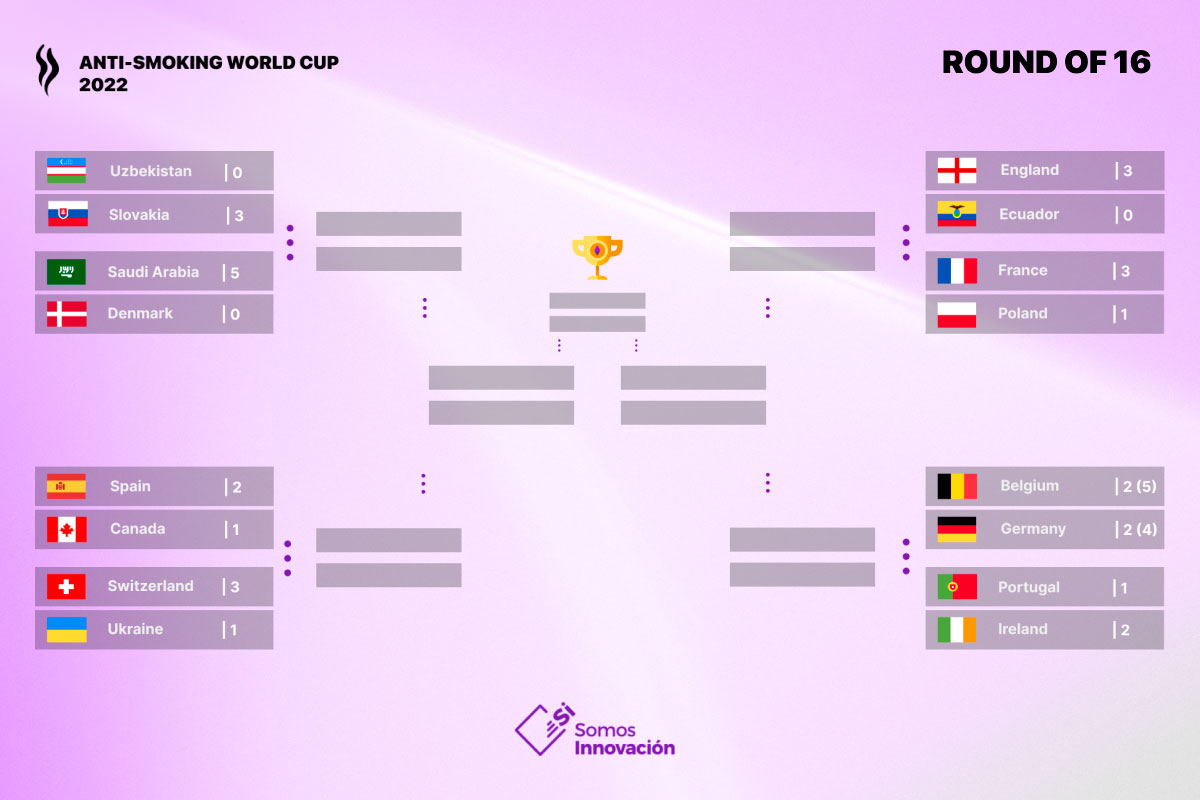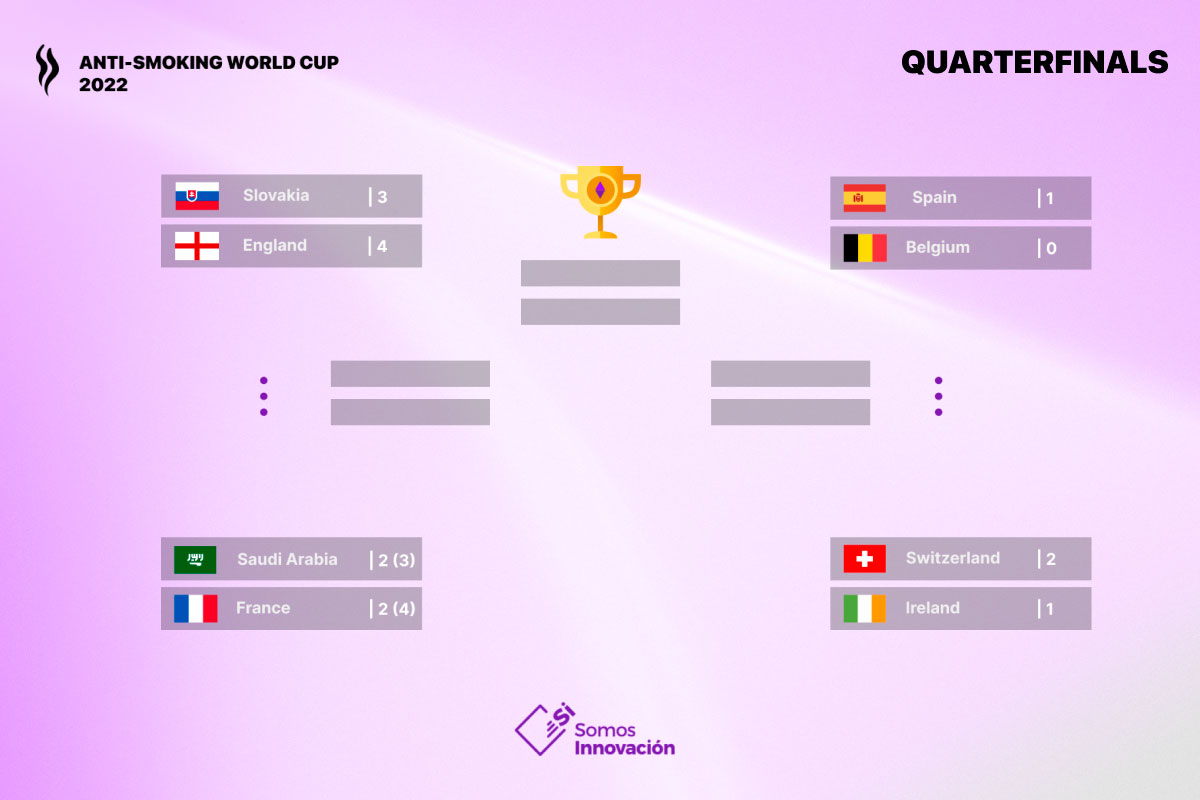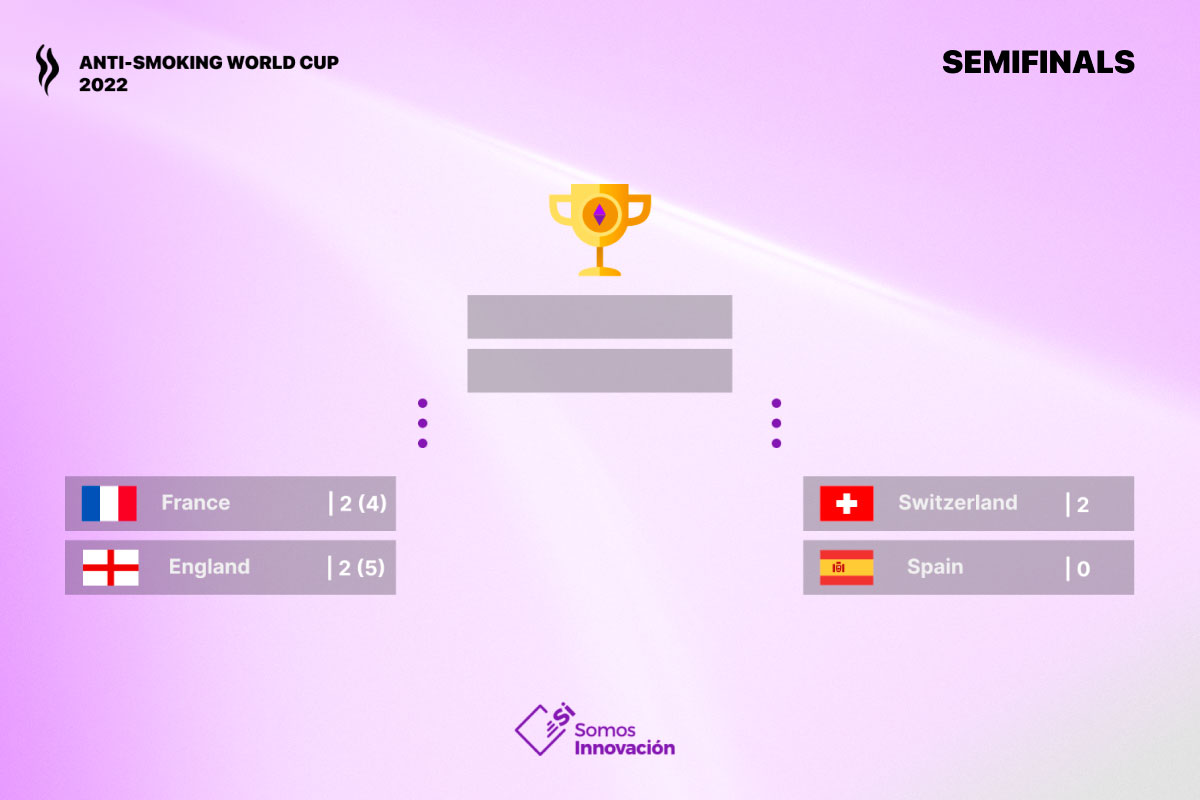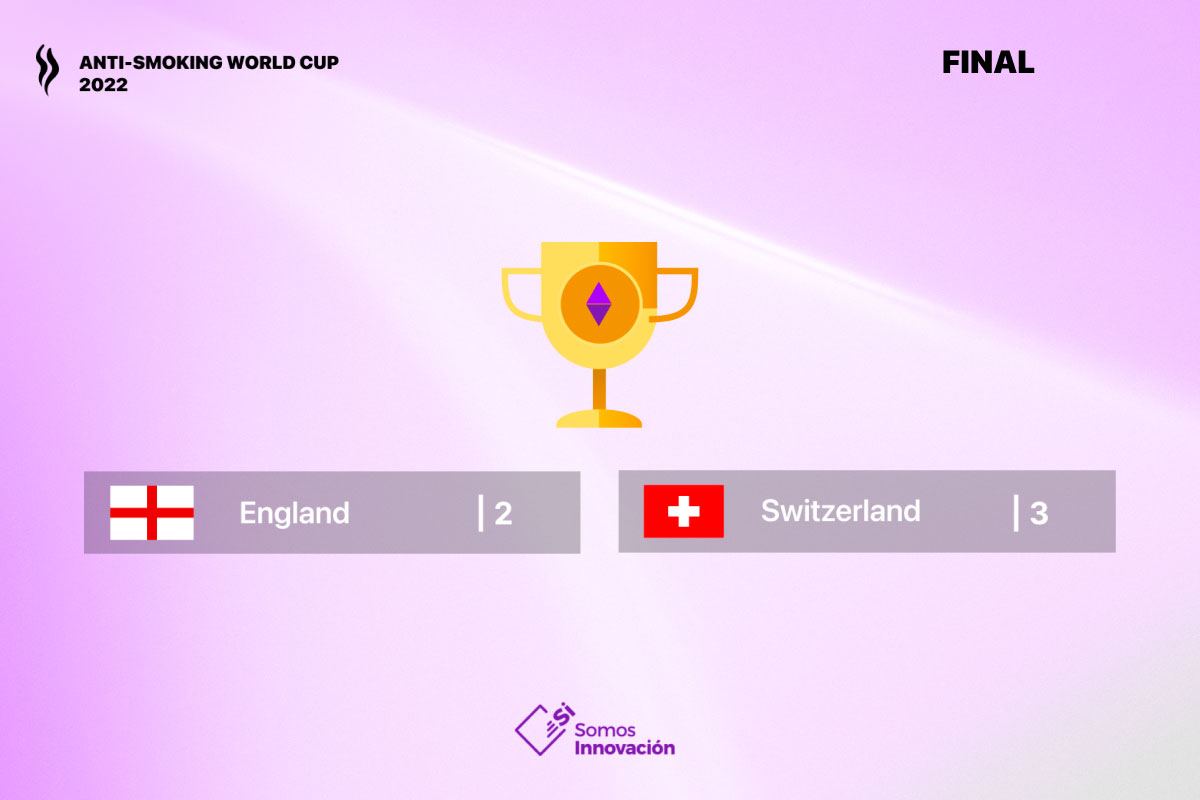One billion people will watch the World Cup final in Qatar, the same number who could live longer if they switched cigarettes to safer nicotine alternatives
In a few days, the 2022 World Cup kicks off in Qatar. For many, the World Cup is the most important sporting competition. 32 teams will face it this year to win it. And every country in the world dreams of ever being the world champion.
What if I told you there is an even more important World Cup and the prize is not a golden trophy but saving millions of lives?
That is what is at stake in the World Cup that we will present to you in this article. Based on the results of the first Effective Anti-Smoking Policies Global Index, published by the We Are Innovation network, we simulated who would be the champion, the surprises, and the biggest disappointments.
What is this index? It is the most comprehensive Spanish-language study that serves as a guide for governments and authorities to analyze the advantages of regulating and implementing smart public policies on Non-Combusted Nicotine Products (NCNPs), which are vital to reducing the harm caused by traditional cigarette consumption, such as vaping. The index also provides scientific evidence from different institutions on their effectiveness in combating addiction, and a ranking that evaluates 59 countries regarding the regulation of these products.
Indeed, innovative alternatives such as vaping are 95 percent safer than traditional combustion cigarettes, according to Public Health England (PHE). Thanks to them, we are on the verge of eliminating smoking as we know it.
If we go back to the comparison with football, according to FIFA, 1.2 billion people around the world watched the final of the 2018 World Cup. Similarly, a paper published in the prestigious scientific journal Science states that:
“The evidence warns against prohibitionist measures. Restricting access and appeal among vape products…does not protect public health, but threatens to derail a trend that if continued could accelerate the demise of cigarettes to the point of saving 1 billion lives this century.”
Thus, as the first Effective Anti-Smoking Policies Global Index explains, smart regulation and a climate open to innovation are essential for a billion human beings to live. Almost the same number of people who will watch the final in Qatar this year.
Group Stage
Uzbekistan* showed a strong pace by winning all three of its matches, albeit barely against Ecuador. In the Central Asian country, none of the traditional smoking cessation products (vape, heated tobacco, nicotine pouches, and snus) are banned. On the contrary, each of them has a specific regulatory framework that frames them outside of combustion tobacco.
Ecuador follows closely behind and is one of the South American powers in this World Cup.
However, the ban on snus and nicotine pouches caused the Netherlands to succumb and drop out of the competition in the first round.
Kenya falls due to the total lack of a regulatory framework for nicotine pouches.
In Group B, England certainly conveys that it is one of the candidates to win the cup. Another solid contender is Slovakia, which qualifies comfortably in second place.
If this were the World Cup, Group B could well be the “group of death.” This is the name given to the group with strong teams. In the case of the Anti-Smoking World Cup, Group B may well be one of the “groups of life.” Why? Because all four teams do well or very well in it, and only two can advance to the next phase.
Lebanon falls behind the European powers due to its lack of a regulatory framework for nicotine pouches, as does Honduras. The case of Honduras is a major wake-up call for Latin American countries. Even though it occupies the podium of the index in the American region, it cannot prevail over the European nations.
The alarm bells that went off in the case of Honduras were confirmed in Group C. Argentina, and Mexico are saying goodbye very quickly to the Anti-Smoking World Cup, almost going out of the window.
The Aztec team loses every game, scoring zero points. That is a result of their aggressive policies regarding vaping and heated tobacco, both of which are banned. Certainly, the fact that the head of Cofepris, Mr. Alejandro Svarch, has called vapers “a perverse invention” does not seem to have improved Mexico’s chances of defeating smoking.
Unlike the FIFA ranking, Argentina occupies one of the last places in the main ranking of the Effective Anti-Smoking Policies Global Index. Its chances were low, and it only managed to beat Mexico, also eliminated, by the slimmest of margins.
In contrast, Saudi Arabia dominates the group with three wins and nine points. With all four products specifically permitted and regulated, that’s a lot, even for Poland, which has a ban on snus.
In Group D, we find some of the weakest anti-smoking countries… And the world’s black sheep!
France sweeps the group, given its global top 5 status.
For their part, Denmark and South Africa will decide on goal difference in a duel of bad students. Ultimately, the Europeans prevail since vaping, heated tobacco, nicotine pouches, and snus have a specific regulatory framework. But neither team looks good, and the Danes’ prospects for further progress are limited.
However, the outlier of the group and of the World Cup is Australia, which leaves with zero points and zero goals scored. A pitiful performance. This is because Australia is the most pro-cigarette-smoking country in the world. There, all the safest nicotine products are banned. It is truly distressing that faced with such a clear choice as Smart Regulation vs. Unintelligent Prohibition, Australians have opted for the latter. In the Anti-Smoking World Cup, the Australian team is the team of death.
Group E reaffirms Europe’s dominance at the Anti-Smoking World Cup. Spain tops the group, followed by Germany.
Costa Rica is eliminated but at least takes third place, while Japan goes home with zero points.
The Ticos are ahead of the Japanese in that both vaping and heated tobacco are allowed and have a specific regulatory framework in the Central American country. The Costa Rican team has a good base but needs to improve. On the other hand, the Japanese will have to do a lot of rethinking after their elimination. In the land of the Rising Sun, vaping and nicotine puches are banned. Meanwhile, heated tobacco falls under the legislation of combustion tobacco, which is a grave conceptual error.
Belgium and Canada, in that order, advance to the round of 16 as Group F representatives. Croatia, whose mediocre performance in the overall ranking of the index places it 33 out of 49, is left out. Nigeria, for its part, does not even play in that league. It is part of the B ranking, for countries that have yet to make any regulatory effort for safer nicotine products. The index’s view is that NPSCs require an intelligent regulatory framework that is open to innovation, protects users, and allows producers in the market to continue to innovate. According to Jeff Stier’s analogy, if we were making a cocktail, the recipe would be nine parts innovation and one part regulation.
Group G had everything. The winner is Switzerland, which won against all its rivals.
At the other extreme is Brazil, which returns home scoring zero goals and zero points. This is because vape and heated tobacco are banned, while snus and nicotine pouches are severely restricted, taxed, and have warnings on their packaging that do not reflect the relative level of harm versus combustion tobacco. Tristeza Não Tem Fim. Neither does smoking.
Ireland went through on goal difference. On the one hand, it is an injustice that Sweden was left out of the cup so prematurely. In other groups, they might even have been first. But, on the other hand, their early elimination shows how every category in the index is worth and makes a difference. Ireland scores 85 points (out of a possible 90) in the vape category of the index, while Sweden scores only 75. While the overall results of the index are weighted 70 percent vape, 20 percent heated tobacco, and 5 percent both snus and nicotine pouches, Sweden is eliminated.
Why this weighting? It responds to the percentages of users of these products worldwide: 82 million vape, 22 million use heated tobacco, and 10 million use nicotine pouches and snus.
Latin America’s poor form is also evident in Group H.
In terms of anti-smoking, Uruguay, ironically known as “the Switzerland of South America,” is more like “the Australia of the River Plate.” Official discouragement of safer nicotine products and a strict ban on vaping make it the second worst country in the world and the lowest ranked in the Americas. While nicotine and THC have nothing to do with each other as substances, it is surprising that the same authorities that have legalized and nationalized the marijuana trade have banned vaping.
Drowned in its contradictions, Uruguay leaves the World Cup without winning a game or even scoring a goal.
In addition to Uruguay itself, Argentina, Brazil, Costa Rica, Honduras and Mexico also dropped out of the competition in the first round. Only Ecuador is through to the round of 16, where mighty England awaits.
This would be an earthquake if it happened at the FIFA World Cup. But let’s reflect for a moment. Smoking is one of humanity’s biggest health problems; more than eight million people die early a year from this addiction. Having such a dismal performance at the Anti-Smoking World Cup is much worse.
Group H is taken by Portugal, a Top 20 in the global ranking. The surprise is Ukraine, after having left Russia on the road in the qualifiers, goes through the round in second place with seven points.
South Korea must settle for only three points, third place in the group, and elimination. Despite having all products allowed, it taxes them disproportionately, restricts nicotine in vape liquids to very low levels, and mandates graphic warnings on packaging.
Round of 16
Once the group stage is over, the round of 16 begins, and the competition will get even tougher.
The first match of the round of 16 pits Slovakia against Uzbekistan. The three-nil defeat of the Slovaks against the Uzbeks is based on the fact that the latter, although they have all the safest nicotine products allowed, do not encourage their use as an alternative to smoking at all, restrict online sales and abuse warnings that are not consistent with the relative harm of the products compared to combustion tobacco.
Although the first round was dominated by Europeans, not all the countries of the Old Continent are the same. Thus, Saudi Arabia gave Denmark an absolute thrashing, beating them five-nil.
The Achilles heel of European countries is the ban on snus that practically all of them maintain. On the other hand, the Saudis allow access to the four products analyzed by the Somos Innovación anti-smoking index.
Denmark also imposes generic packaging and advertising restrictions. These are very counterproductive measures. The former encourages counterfeiting and smuggling, while the latter prevents smokers from having information on safer nicotine products.
Victim to its own shortcomings, Denmark leaves the anti-smoking World Cup with a drubbing by the Saudis.
Spain vs. Canada was a very tough match. Unlike the previous game, this time it was the European strengths that made the Iberians prevail.
The Canadian ban on flavors for vaping is undoubtedly one of the points that hit directly under the waterline of their aspirations to move forward. Flavors are essential in attracting current smokers to alternatives like vaping and keeping them there, making them give up cigarettes for good.
In this regard, Europe is at a crossroads. This year, the European Commission launched a call for opinions on its Tobacco Products Directive (TPD), which regulates traditional tobacco products and NCNPs. The initiative gathered a staggering 24,359 responses in less than a month. The current EU directive already imposes limits and restrictions that hinder the effectiveness of NCNPs as smoking cessation tools. It would be very dangerous if such limitations were deepened, for example, by banning flavors.
For now, in any case, Spain wins two to one and moves on to the next round.
The Ukrainians fought bravely against the Swiss and even took the lead. However, Switzerland was too much for them and dispatched them with a final score of three to one. Some reasons for the Swiss triumph are related to the fact that while their Parliament rejected a proposal in 2021 to ban all advertising of heated tobacco in Ukraine, advertising has been banned since the beginning of this year, and snus will be banned in 2023.
We all know the problems Ukraine is going through and the courage of its population in the face of unjustified aggression. Let us hope that when the gale passes and Ukraine regain absolute sovereignty over its territory, it will reverse the restrictive measures it has put in place, which end up encouraging smoking among its population.
The match between England and Ecuador ends all Latin American aspirations to win the Anti-Tobacco World Cup.
Three zeroes for the English. Ecuador falls with its head held high because it is the Latin American country that has made the most progress. Vaping, heated tobacco, snus, and nicotine pouches are allowed in that country. However, to be an anti-smoking powerhouse, it will have to review the official discouragement of safer nicotine products, advertising bans, and graphic warnings, among other measures.
France is too much for Poland. The Central European country falls largely because of its ban on online sales and the strong official discouragement of vaping, for example. While in France, although still timid, there is support from health authorities for vaping as an alternative to the combustion cigarette. Three to one and France advance to the quarterfinals.
Belgium vs. Germany was decided by penalties after a two-two draw in 120 minutes. In an ultra-even match, the Belgians prevailed as they, unlike the Teutons, allow nicotine pouches.
Another even match is the one between Portugal and Ireland. As in any important football match between two powerful teams, it is won by details. What tips the scales in favor of the Irish is that they allow the online sale of vape products.
In anti-smoking policies, one “detail” can save many lives. The ability of adults who want to quit smoking to have all avenues of access to the safest nicotine products is literally vital. None of the categories evaluated are whimsical.
The ten categories studied and measured were:
- Regulatory Framework
- Banning
- Flavors
- Packaging
- Display
- Advertising
- Retail Availability
- Online Sales
- Taxation
- Promoting Tobacco Harm Reduction
Together, they made it possible to survey in general terms the attitude of each national state concerning the NCNPs.
Quarterfinals
The quarter-finals kick off with a truly great match: Slovakia vs. England. A festival of goals and good football, metaphorically speaking. The English beat the Slovaks four to three.
Although both countries have a ban on snus, the difference lies in their treatment of vaping. While Slovakia’s is almost perfect, England’s is perfect. So much so that in the anti-smoking index of We Are Innovation, in the vape category England scores 90 points out of a possible 90.
In any case, both countries have room for improvement concerning snus, obviously, but also heated tobacco and nicotine pouches.
The duel between Saudi Arabia and France is very even and will be decided in a penalty shootout. The balance ends up tipping in favor of the French because they have a better score on vaping and because the Saudi authorities must resolve certain regulatory ambiguities in treating innovative anti-smoking products. Two to two and France goes through on penalties.
The match between Spain and Belgium is very close. Spain wins by the narrowest of margins. The one-nil scoreline is based on the fact that the Iberian country allows smokers who want to switch to vape products to quit the habit to buy them online. Also, advertising nicotine pouches is permitted in Spain but not in Belgium. This means that current Belgian smokers have restricted access to information about nicotine pouches as an alternative to smoking.
Ireland makes a good impression at the anti-smoking World Cup but leaves defeated by Switzerland two to one. In the same way that in a football competition, having a goal scorer is a trump card, in the anti-smoking World Cup, having vaping, heated tobacco, snus, and nicotine pouches allowed is a match-winning card.
Although the Swiss tie with the Irish in vaping (both score 85 out of a possible 90 points in the Somos Innovation index), they clearly win in the other three products.
Switzerland is, therefore, a fair semifinalist.
Semifinals
We reached the semifinals and we have four European teams in the semifinals. Africa, Asia, and Latin America succumbed very quickly in the competition. Not for nothing, from 41st to 49th place in the main ranking of the Somos Innovación index are all Latin American countries, except for Australia, which is a veritable hellhole for anti-smoking.
Interestingly, these countries also rank very well in measures such as Yale University’s Environmental Performance Index or Transparency International’s Corruption Perceptions Index. All indications are that good governance linked to safer nicotine products correlates with good policies on key issues such as the environment and anti-corruption.
Having said all this, the match between England and France also highlighted the scope and limitations of anti-smoking policies in both countries. The 2-2 draw and England’s miraculous passage to the final on penalties showed that while both teams are very good, they are far from invincible.
Where do they fail? Both have a ban on snus. It comes from a European Union (EU) regulation. Interestingly, England is no longer a member of the EU. Regardless of what we think of Brexit, it is striking that a country so favorable to safer nicotine products still has it banned.
However, England does better than France on several key issues. Such as encouraging vaping as a harm-reduction tool. England goes through to the final.
The other semi-final is less close.
Switzerland beats Spain by two goals to zero. Except for vaping, where in the Somos Innovación index they tie with 85 points out of a possible 90, Switzerland clearly beats Spain in the other three categories. The possibility of online sales of heated tobacco makes a difference in favor of the Swiss, as does the intelligent regulatory framework for nicotine pouches. In Spain, this is lacking.
Switzerland advances to the final, where England awaits.
Final
We reached the grand finale.
It is a memorable match. England took the lead in the first half, scoring two goals in a flurry. That’s because England has a perfect score in the vape category and is one of only two countries in the world that encourages it – even subsidizes it when bought on prescription – as a smoking cessation therapy.
However, Switzerland also has its arguments. Shortly before the end of the first half, the Swiss scored a goal based on the fact that they were allowed to use snus while England banned it by maintaining an EU regulation to which it no longer belongs.
The second half begins, and the Swiss team seems revitalized after their goal. Thus, they get a draw due to their better score regarding the regulation of nicotine pouches (80 points for Switzerland against only 65 for the English).
Switzerland scores its third goal, which is the winning goal. As we have been saying in other matches, as in football, things are defined by details here too. Switzerland plays the snus card again: Not only is it allowed to do so, but its regulation is smart and open to innovation, scoring 80 out of a possible 90 points in the We Are Innovation index. England, in that category, scores a meager 20 points.
Three to two, the final result. Switzerland is the World Anti-Smoking Champion.
The game continues
As in football, this final also requires analysis.
It’s not that England lost the championship; they won second place. It is also worth noting that the English would be the world champions if this were just the vape World Cup.
The unjustified and anachronistic ban on snus leaves them at the gates of the championship. That is a key area where they should focus to be number one in the world. They can also improve the public policy framework for nicotine pouches and heated tobacco.
However, it is imperative to note that England is one of the few countries with the lucidity to encourage vaping as a smoking cessation tool. This decision will make millions of English people live longer and healthier lives. And this success in its public policies has turned it into a worldwide beacon and a source of knowledge, thanks to the studies and measurements that Public Health England has been carrying out.
Switzerland, for its part, is the champion. But now it is up to them to defend their title. The critical area it needs to improve is promoting harm reduction through its public policies.
Both countries show the rest of the world where to go. The points we have made about both are infinitely more sophisticated and subtle than the real prohibitionist horrors of countries like Australia, Uruguay, or Mexico.
Finally, although it was not in our World Cup for football reasons, New Zealand is also a great anti-smoking power. Along with the United Kingdom, it is the country that has been encouraged to promote vaping as an alternative to smoking cessation, and its tax policies take into account the risk profile of these products.
Download the Anti-Smoking Index
The Effective Anti-Smoking Policies Global Index demonstrates that the use of vaping and other non-combusted products can have a significant positive impact globally. It also provides global examples and a roadmap for what public policies are conducive to harnessing the benefits of these innovative products.
Access all the results here.
* Note on the World Cup teams: since some countries qualified for the 2022 World Cup in Qatar are not part of our index, they were replaced with the following criteria: a) same Confederation or b) similar position in the FIFA ranking to the country they replaced.
** Federico N. Fernández is the CEO of We Are Innovation
Source: We are Innovation

